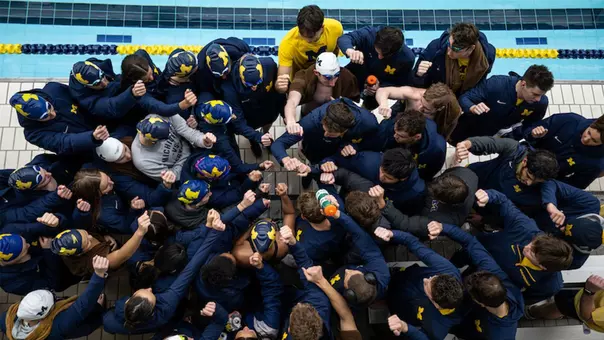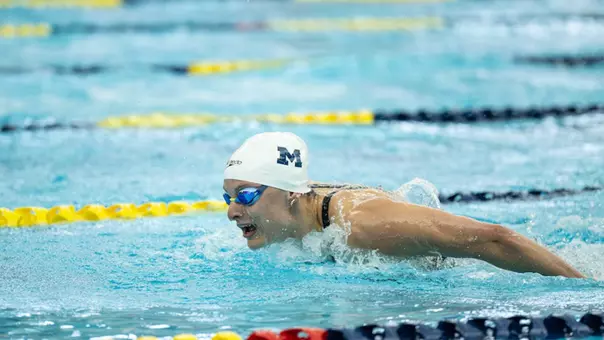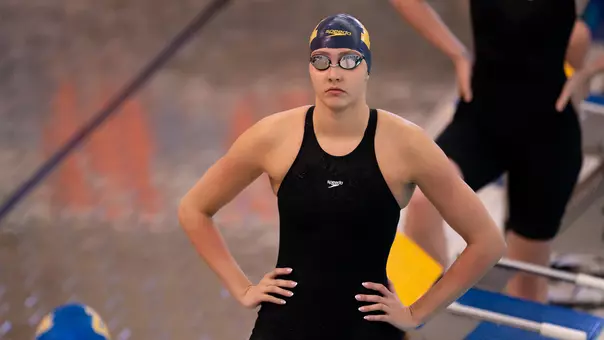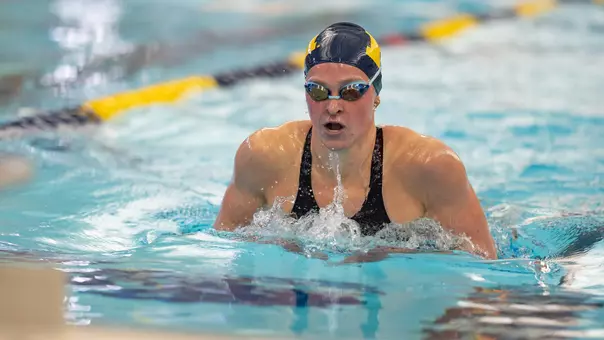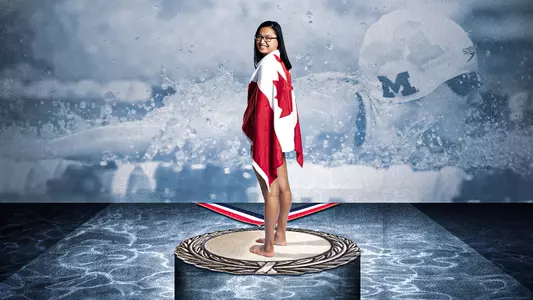
World's Best: How Maggie MacNeil Went from Unknown to World Champion
3/5/2020 2:00:00 PM | Women's Swimming & Diving, Features
Note: This article initially appeared in the fall issue of M Magazine. Since then, MacNeil tied the NCAA record in the 100-yard butterfly (49.26) at the Minnesota Invite in December. She was named 2020 Big Ten Swimmer of the Championships in February after winning the 50-yard freestyle, 100-yard freestyle and 100-yard butterfly while also swimming on three victorious relay teams. MacNeil is seeded No. 1 in the 100 fly and No. 4 in two freestyle events for the NCAA Championships, slated for March 18-21 in Athens, Georgia.
By Brad Rudner
Maggie MacNeil capped off a magical year with a performance that few saw coming -- including herself.
At the FINA World Championships last July, MacNeil stunned the international swimming community by winning a gold medal in the 100-meter butterfly, dethroning the reigning Olympic champion and forever etching her name into the history books.
In that race, MacNeil, a 19-year-old now-sophomore from London, Ontario, Canada, rallied from fifth place at the halfway mark to chase down Sarah Sjöström for gold, handing the Swedish superstar her first loss in that race in seven years. MacNeil finished in 55.83, setting new Commonwealth, Americas and Canadian records while becoming the second-fastest performer in history.
As improbable as a victory seemed at the beginning of the year, here she was, floating in a lane between two Olympic medalists knowing she beat both of them and everyone else. At that moment, she was the best in the world.
MacNeil still remembers the race like it was yesterday. Of course, it's not something you're likely to forget.
"When I glided into the touch, I didn't know if Sarah got there before me. I knew I was first or second," she recalled. "I couldn't see the time on the board. Emma [McKeon] told me that I went 55. I was like, 'Really?' I didn't have any words."
Watch the race's exciting finish:
A fantastic race in the Women's 100m Butterfly where everybody was expecting "Super Swede", Sarah Sjöström, to add to her gold-collection…everybody that is, except a 19-year old from Ontario. #FINAGwangju2019 #Swimming pic.twitter.com/GXqZZaDwK5
— FINA (@fina1908) July 22, 2019
Thank you to everyone for their support and congratulatory wishes. So proud to rep the best country in the world ?????? pic.twitter.com/OGRArKF9bq
— Maggie Mac Neil (@mags_swims26) July 22, 2019
The journey to that fateful night in South Korea began 11 years before. It was after the 2008 Olympic Games in Beijing that MacNeil first ventured into competitive swimming, more as a way to both make friends and feed off the post-Olympic momentum.
Canada has grown itself into a swimming powerhouse, one of a handful of countries that have medal candidates in nearly every event on the women's side. When it came time to choose a college, MacNeil kept distance in mind. If she was going to stay in Canada, it would have been at the University of Toronto. But if she was going to come to the United States, it was going to be the University of Michigan.
The tipping point? Resources. Michigan had them, and Toronto couldn't compare.
"As we went through the process, everything about Maggie pointed to her being a great fit with us," said U-M associate head coach Rick Bishop. "She had good times, but we didn't think she'd be the world champion she became."
Looking back, maybe the win wasn't so surprising after all. Before the start of her freshman year, MacNeil had a choice to represent Canada at either the Pan Pacific Championships or the Junior Pan Pacific Championships. But Pan Pacs, a quadrennial meet that was founded by the U.S., Canada, Japan and Australia, interfered too much with her summer studies. She went to Junior Pan Pacs instead, winning a gold medal and setting the meet record in the 100-meter butterfly.
People began to take notice, including her coaches.
In one of her first introductions to racing yards, she broke a school record in a mid-October dual meet without wearing a streamlined racing suit. Six weeks later at the UGA Fall Invitational, she became the fourth woman in NCAA history to break the 50-second barrier.
"She was good all the way around," Bishop said. "I remember thinking, 'We've got a player here.'"
MacNeil was even better in the postseason. She was a four-time Big Ten Conference champion, winning the 100-yard butterfly (49.66) and 50-yard freestyle (21.65), and was a seven-time All-American at the NCAA Championships, making finals in all three individual events.
"Every time I'd swim, I'd go a best time and it would be great," she said. "That's what I enjoyed most about last year. It took the pressure off and allowed me to swim for fun without worrying about times."
Canada is unique from other federations in that it holds its swimming trials two weeks following the conclusion of the collegiate season. A quick turnaround is made even quicker when factoring in the switch from racing yards (as in the NCAA) to meters.
That's challenging enough. But making matters potentially worse, MacNeil got sick one week before Trials began, which set her back in training.
If it affected her, she didn't show it. On the second day, MacNeil finished fourth in the 100-meter freestyle, officially making the team on the 4x100-meter freestyle relay.
"It was exciting," she said. "At that point, I couldn't believe I would swim on a relay with Taylor [Ruck] and Penny [Oleksiak]. I had the butterfly the next day, but that race took the pressure off. It was the least nervous I've ever been."
MacNeil went on to win gold medals in the 100-meter butterfly, 50-meter freestyle and 50-meter butterfly. Over the course of those five days in Toronto, she went from swimming on a single relay at the World Championships to suddenly having a pretty full schedule.
After staying in Toronto for a week-long training camp, MacNeil returned to Ann Arbor where Bishop instructed her to take off a week and a half. She didn't get in the water once, using that time to instead catch up on batches of coursework that went unattended while she was gone.
By the time she got to Gwangju, MacNeil had one goal in mind: win a medal. She didn't care what color.

(Swimming Canada/Ian MacNicol photo)
On the first night of the World Championships, MacNeil qualified second for the 100-meter butterfly final the next day, clocking in at 56.52, about a quarter of a second behind Sjöström. The Canadian coaches also told her that she'd be anchoring the team's 4x100-meter freestyle relay.
Stepping up to the blocks for that race, MacNeil peered left. There stood the American, Simone Manuel, the 2016 Olympic gold medalist in the 100-meter freestyle. To her right was the Australian, Cate Campbell, the 2013 world champion in the 100-meter freestyle.
MacNeil dove in with a lead, but Manuel and Campbell surpassed her at the wall. She split 53.18 -- significantly better than the morning's preliminaries (54.00) -- and helped Canada win the bronze medal by a healthy 3.5-second margin over the Netherlands. Canada set a national record, surpassing their time from the 2016 Olympics in Rio.
"Seeing those two swimmers next to you, you do pinch yourself," MacNeil said. "I definitely didn't feel like I could beat them. I just wanted to get us a medal. I caught the lane line and rode the waves all the way down."
Somewhere in the warmdown area, she ran into Michigan head coach Mike Bottom, who was on deck in Gwangju. With that bronze medal in tow, MacNeil joked about how she'd never been drug tested.
Bottom replied: "You will be when you win tomorrow."
(Swimming Canada/Ian MacNicol photo)
One day in and the meet was already a success. Win a medal? Check. Make a final? Yep.
The next night going into the 100-meter butterfly final, MacNeil adjusted her goals. After going the second-fastest time in the semifinals, she vaulted herself into medal contention. The Canadian record was also within reach, held at the time by Oleksiak, the Olympic silver medalist from 2016.
She looked around the race ready room. There was Sjöström, the world record-holder and top seed. McKeon was there. So was Kelsi Dahlia, a former NCAA champion at Louisville, and Louise Hansson, who four months earlier beat MacNeil in the 100-yard butterfly at the NCAA Championships.
MacNeil went out and took them all down. The gold medal -- and the Canadian record -- were hers.
Bishop could only laugh at what he saw.
"At no point in time can you take the world's greatest female 100-meter butterflyer for granted," he said. "Sarah Sjöström is the G.O.A.T. She holds nine of the 10 fastest performances in history, and the one who interrupted that streak is Maggie. I wasn't thinking about winning. That's a foolhardy statement. I wanted Maggie to be in a spot that if the opportunity presented itself, if Sarah blinked, she would be there.
"It was like nothing I'd ever seen. Are you kidding me? She just passed the greatest swimmer in her event in the world over the last decade. It's a credit to Maggie, her work ethic and her training. A year ago, she was a junior-level swimmer fighting for gold at Junior Pan Pacs. Now, there she was coming from behind to beat the Olympic gold medalist and world-record holder. I couldn't believe she actually did it."
Having seen her train for nearly a year, the win didn't come as a surprise to Bottom. Going into the final, he was confident she'd not only medal, but win the whole thing. "The way she swam, we've known all year that Maggie is a finals swimmer. She will get faster in finals," he said. "She was already fast in the semifinals. It was a no-brainer."
In less than a minute of racing, she went from regionally known name -- at best -- to garnering worldwide fame.
Leaving the pool that night, there was a line of people waiting to get pictures and autographs. Back in Canada, as people woke up and saw the news, her name was trending on Twitter. She got hundreds of messages on Facebook and Instagram, the majority coming from people she didn't know. It took two hours to go through all of them.
There's no question that being a world champion has changed her life, but not here on campus. Nobody stops her for pictures or autographs. She goes about her business in an unassuming way, which is how she likes it.

Despite the success so far, making it to the 2020 Tokyo Olympics isn't guaranteed, and MacNeil knows that.
"She's still the same person," Bottom said. "Being at the top, in a sport like this, it has to affect her a little bit. That's why it's truly important that she stay herself, stay grounded. She's working every day to be better. If she can stay in her own rhythm, she'll be fine."
She contemplated taking an Olympic redshirt, like some of her Canadian teammates, but felt that swimming for Michigan this year would help more than it would hurt.
"After Trials, I started to seriously think about it," she said. "I sat down with Rick and we made a pros and cons list, and the pros won out. I'm excited to swim this year. The dual meets will help my racing and break up the training. One concern was how close NCAAs is to Trials. I'll have to do that again, but I'm better prepared now having gone through it once."
As for what to improve, MacNeil points to increasing her front-end speed, improving her turn off the wall and perfecting her dive off the blocks. Within the team, she wants to show the freshmen how they can improve like she did.
"The best comment I read after I won was, 'She didn't even win NCAAs,'" she said. "First off, that's definitely a goal. I want to challenge for that NCAA title. But more than that, I want a ring so badly. People are counting us out already. That's going to fuel us."
Reflecting back all these months later, MacNeil remembers one thing that Bishop told her after the race.
"That was good," he said, "but it can be better."
MacNeil felt the same way. And for the world's swimmers, that's a scary thought.

